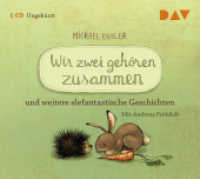Full Description
This book that explores the mathematics education of Latinos/as in 13 original research studies. Each chapter represents research that grounds mathematics instruction for Latinos/as in the resources to be found in culture and language. By inverting the deficit perspective, this volume redresses the shortcomings found in the previous literature on Latino/a learners. Each study frames language (e.g. bilingualism) not as an obstacle to learning, but as a resource for mathematical reasoning. Other chapters explore the notion of cultural variation not as a liability but as a tool for educators to build upon in the teaching of mathematics. Specifically, the book reframes culture as a focus on the practices, objects, inscriptions, or people that connect mathematical concepts to student thinking and experiences, both in and out of school.
The book's four sections divide the research: The first section of the book focuses on mathematic learning in classrooms, specifically exploring bilingual, Latino/a students; the second section explores Latino/a learners in communities, including the role parents can play in advancing learning; the third section includes chapters focused on teacher professional growth; the final section concerns the assessment (and mis-assessment) of Latino/a learners. The research shared in this volume provides ample evidence that mathematics educators who choose to ignore language or culture in their pedagogy risk shortchanging their Latino/a students.
Contents
Preface.
Chapter 1. Latinos/as and Mathematics Education: Why This Book Now? Kip Tellez, Judit Moschkovich, and Marta Civil.
Chapter 2. Latino/a Students' Understanding of Equivalence: Use of Two Standards-Based Curricula in Eighth-Grade Algebra; Nancy O'Rode.
Chapter 3. Bilingual Students Using Two Languages during Peer Mathematics Discussions: Que Significa? Estudiantes Bilingues Usando Dos Idiomas en sus Discusiones Matematicas: What Does it Mean? William Zahner and Judit Moschkovich.
Chapter 4. Student Resistance in a Fifth-Grade Mathematics Class; Heather Cavell.
Chapter 5. Situating Mexican Mothers' Dialogues in the Proximities of Contexts of Mathematical Practice; Higinio Dominguez.
Chapter 6. Conversations Around Mathematics Education with Latino Parents in Two Borderland Communities: The Influence of Two Contrasting Language Policies; Jesus M. Acosta-Iriqui, Marta Civil, Javier Diez-Palomar, Mary E. Marshall, and Beatriz Quintos-Alonso.
Chapter 7. Latino/a Bilingual Elementary Students Pose and Investigate Problems Grounded in Community Settings; Erin E. Turner, Maura Varley Gutierrez, and Javier Diez-Palomar.
Chapter 8. A Case Study of Multigenerational Mathematics Participation in an After-School Setting: Capitalizing on Latinas/os Funds of Knowledge; Hector Morales, Jr., Eugenia Vomvoridi-Ivanovi, and Lena Licon Khisty.
Chapter 9. Algebraic and Geometric Representations of Perimeter with Algebra Blocks: Professional Development for Teachers of Latino English Language Learners; Cynthia O. Anhalt and Matthew Ondrus.
Chapter 10. Situating Mathematics Professional Development: A Bilingual Teacher and Researchers' Collaboration; Sandra I. Musanti, Mary E. Marshall, Karla Ceballos, and Sylvia Celedon-Pattichis.
Chapter 11. Mathematics Learning with a Vision of Social Justice: Using the Lens of Communities of Practice; Beatriz Quintos, Marta Civil, and Olga Torres.
Chapter 12. English Language Learners' Conceptual Understanding of Fractions: An Interactive Interview Approach as a Means to Learn with Understanding; Libni Berenice Castellon, Laura G. Burr, and Richard S. Kitchen.
Chapter 13. Language Issues in Mathematics and the Assessment of English Language Learners; Guillermo Solano-Flores.
Chapter 14. Teacher Quality, Academic Tracking and the Mathematics Performance of Latino English Learners; Eduardo Mosqueda.
About the Contributors.








